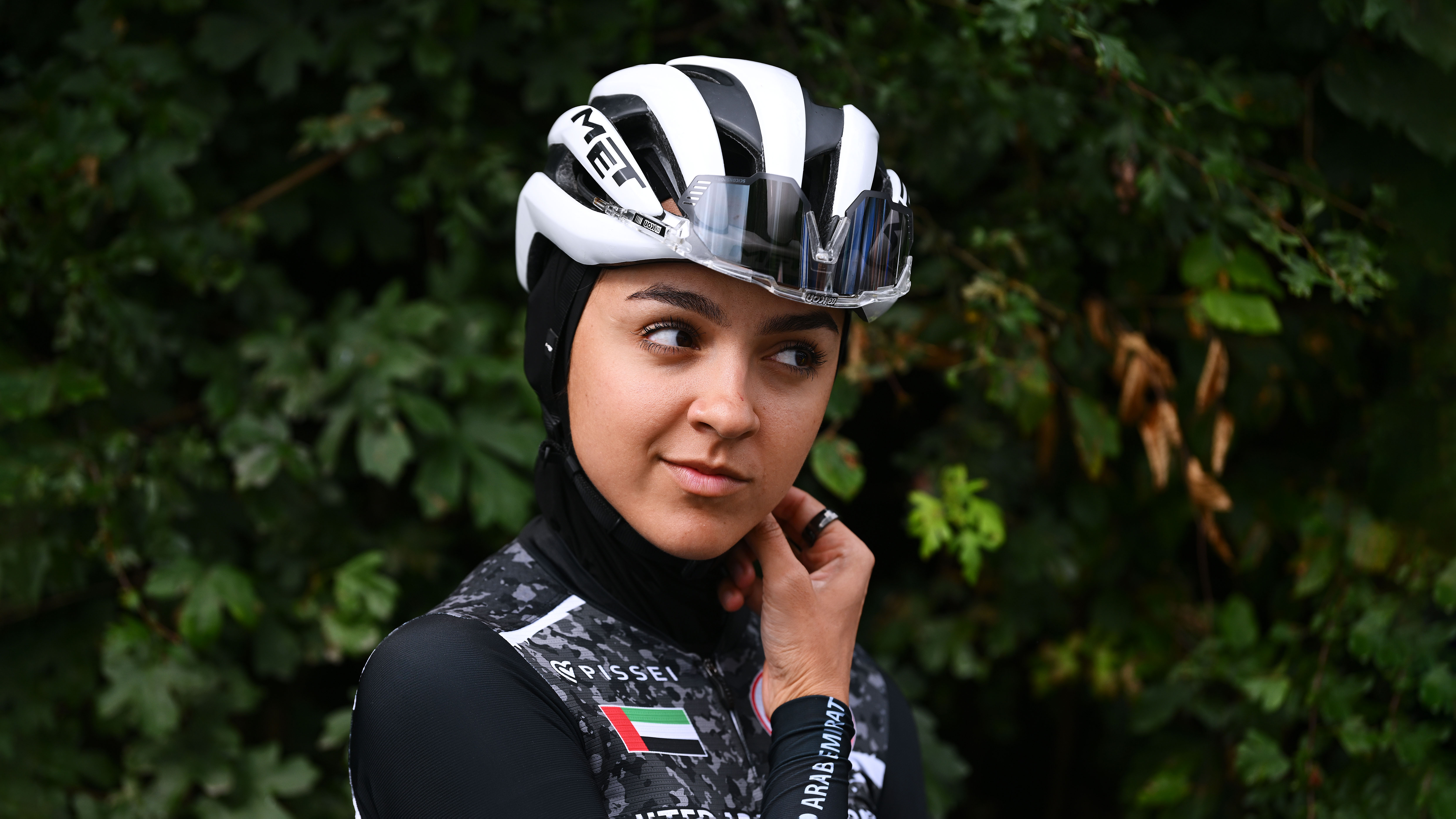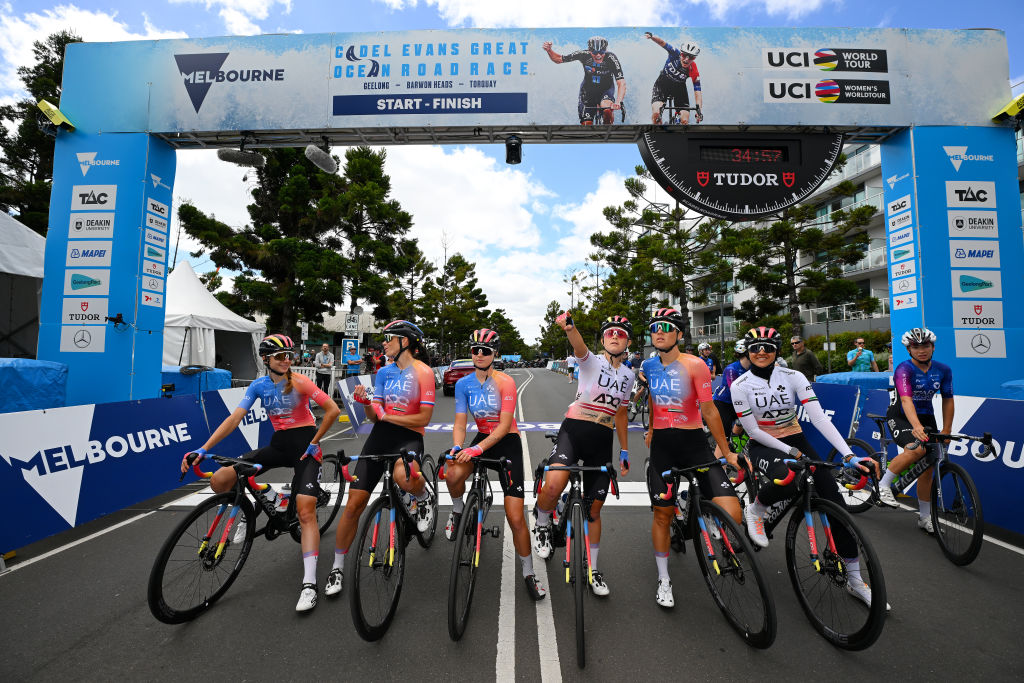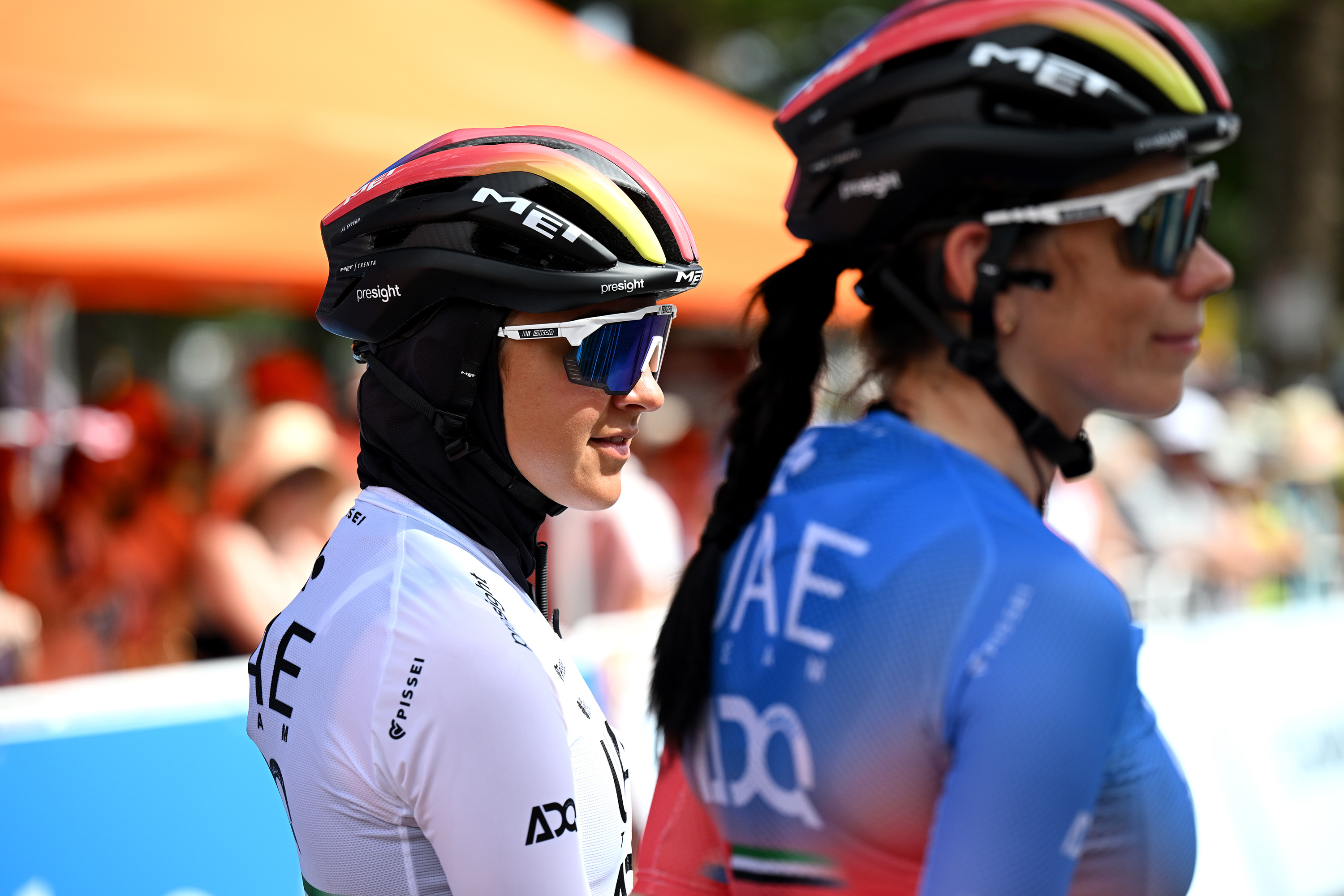
{kiosq_button:center}
For Safiya Al-Sayegh (UAE Team ADQ), the 2024 season will mark the highlight of her cycling career so far as she is preparing to race in the Olympic Games road race in Paris.
Cyclingnews sat down with the 22-year-old Emirati to talk about her way into pro cycling, her goals for the future, and the development of women's cycling in the Middle East.
Even though she was not racing the UAE Tour Women herself, having made her season debut in the Australian races in January instead, Al-Sayegh was in high demand by local media and fans as she is the first Emirati women's cyclist to qualify for the Olympics. Sometimes, she has to dampen her compatriots' enthusiasm.
"People come to me and say, 'We'd love to see you on the podium', but the qualification itself is such a big thing to me," she said. "I actually really appreciate people who come up to me and say 'do your best' rather than have the pressure of a medal because, realistically, we know the gap between our region and the rest of the world is big. It is such a new sport here.
"I aspire to finish the Olympics and be in the competition, not winning it, but to be there to honour the flag of my country in such a prestigious race and hopefully make it to the Olympics in the coming editions as well. It's such an honour to be the first Emirati women's cyclist to qualify. Our champion in the male team qualified for Rio and Tokyo, and I aspire to be the next to qualify for several Olympics." [Yousif Mirza qualified for the Tokyo Olympics but, in the end, did not participate in 2021 after the COVID-19-induced postponement, ed.]
When she lines up with the best of the sport in Paris, Al-Sayegh will have come a long way from her beginnings in cycling. When she was 14 years old, her father, a former professional footballer, bought bikes for both of them, and they started riding around the neighbourhood.
"It was a good start to get cycling fitness because it is very different to other sports. I was doing some ball sports, team sports, swimming, and gymnastics, but cycling uses different muscles, and you need a lot more stamina for it. I learned to change gears and other stuff and then rode my first road bike in 2016. I was really thrilled with the feeling on the bike. I learnt about the Dubai Tour amateur race and that it was for women as well. I never knew there was actually competitive cycling," Al-Sayegh describes how she got into cycling.
"Then I heard that the national team was recruiting; they wanted younger students to develop them along the way, and it started from there, racing small international races up to being a pro today, which I never actually thought I would become. It's not that I wouldn't have dreamt of it, but there just weren't the opportunities back then.
"It is nice to look back on and gives me motivation to dream bigger for the future because I didn't dream as big as a young child. I got the Olympic dream along the way and turned it into a goal to work for, and this pushes me to dream even bigger," she said.
Step by step to the Women's WorldTour

Al-Sayegh got her first taste of European racing in 2017 when she participated in the Rás na mBan as a 15-year-old. After that, she raced for Dubai's Al-Nasr Club, the Abu Dhabi Cycling Club, and the Dubai Police Team, winning the U-23 Arab ITT Championships in 2021. By this time, she was already on the radar of the people who were putting together the UAE-sponsored WorldTour Team for the next season.
"When I was contacted by the UAE Team ADQ management, I was a bit doubtful about going that extra step with pro cycling," the 22-year-old looks back on the decision she had to make some two years ago.
"I knew that it would take a lot of commitment, and I'm already very committed to my studies. That's one of the conditions my father gave me when I started cycling. I was a student back at school, and he didn't want that to go away. Then I got a university scholarship, so I was having second thoughts. Should I go for pro cycling or not? But obviously, it's an opportunity that you shouldn't waste, and after negotiating with my father, we said, 'Okay, let's do it.' It has been a struggle at times to combine it with the university, but it is going well, and I am glad that I did it."
From the start, Al-Sayegh was aware of the dangers of concentrating solely on the sport – her father quit his studies for his football career and was adamant that she didn't do the same.
"The reason why I really push to finish my degree is that you always need something to fall back on. You don't want to be 30 or 40 years with no other opportunities. I mean, there are good opportunities within the peloton now, so you do have some options, but it is good to have a degree to fall back on to have a stable income," Al-Sayegh agreed with this point of view.
The 22-year-old from Dubai has been on the roster of UAE Team ADQ since 2022, but she did not race with the WorldTour team in her first season, instead focussing on her university studies, competing domestically, and racing for the UAE national team, a.o. winning the national time trial and road race championships and finishing runner-up in the Arab Championships.
In 2023, she was 'loaned' to the UAE Development Team for the 2.2 races Princess Anna Vasa Tour and Giro Toscana Femminile, with her start in the Glasgow World Championships in between. Al-Sayegh finished 64th in the Polish race but did not finish the hard World Championships race and abandoned the Giro Toscana on the third and final stage.

At the end of the year, she finally made her debut on the WorldTour stage, being selected for the Tour of Chongming Island and Tour of Guangxi where she performed her role well and could be seen high-fiving Chiara Consonni after the Italian sprinter had won stage 3 and the GC of the Tour of Chongming Island.
She is the only Arab rider in the Women's WorldTour peloton and chooses to wear long-sleeve jerseys and long bib trousers, also wearing a hijab under her cycling helmet. She attended the final stage of the UAE Tour Women wearing a hijab beautifully adorned with small metal studs, putting her own personal style on the Islamic dress code.
Al-Sayegh is part of a young Arab generation that wants to combine the local traditions with the opportunities the country's development affords them, combining her graphic design studies with a pro cycling career.
"I was thinking of interior design, but I went with graphic design; it's a major that is quite in demand, and I see myself combining cycling or the sports industry with my major into a career after cycling," Al-Sayegh is already looking to the future – but she doesn't want to wait until after her pro career to use her design skills.
"We were in talks about me designing the UAE Tour kit, we didn't go on with that, but hopefully next year I can design a kit for my home country's race and race it as well," she said.
Paving the way for other women's cyclists
"One of my goals with pro cycling is to close that huge gap you have from the Middle East to Europe. Year by year, the gap is shrinking but it's such a big gap to be able to close it in a year or two. Within the next five years, I hope to be racing at that level and to be competing with the best," Al-Sayegh is aware of what is still ahead of her, treating the Paris Olympics as a step along the way rather than the end goal in itself.
Over the coming years, she wants to develop further, especially in stage racing and time trials.
"At the level I've been racing the last years, I've been told that I'm an allrounder because I can get through most conditions, but as your level gets higher and higher, you have to specialise. I have been doing well with the first steps of stage racing, three to four days, and I feel like I get better and better every day, so it's good to see that my body adapts to fatigue, it's a good insight to work on for the future. I also have good results in the individual time trial, that's something I want to explore even more and see how far I can go," she described her specialities.
Possibly the most important aspect of Al-Sayegh's career, though, is to establish a pathway for other Emirati women to follow her into pro cycling, combining the sport with a higher-level education.
"We have our development team with one Emirati rider, Zahra Hussain. And we have introduced the Emirati Talent Program where the team is supporting, coaching and offering local riders experiences with pro riders, training camps with us, and a lot more along the way, so it's definitely a good step for Emirati women aspiring to become a pro.
"This year, we have also introduced an academy for cycling, I'm really happy about that, and I hope to develop it into a bigger initiative. One thing that I really hope to be able to contribute to in the future is to have a school or academy that supports studying and cycling at the same time. Cycling is a sport that takes so much time, to have an institute that supports that while you can study at the same time could really help the development," Al-Sayegh said.
It is far too early to say how far Safiya Al-Sayegh can make it in pro cycling. What is already clear, however, is that no matter how many races she wins, she will be the trendsetter for the generations of Arab and Muslim women that are still to come – just like the Colombians or Australians in the 1980s or the Black Africans of the 2010s paved the way for Grand Tour winners and world champions, there will be Arab riders at the top of pro cycling eventually.
{kiosq_button:center}








